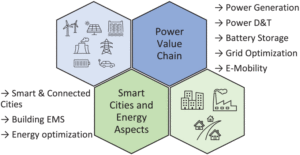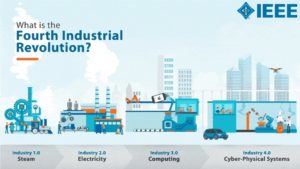Today’s energy systems in smart cities are undergoing a significant digital transformation due to advances in renewable energy technologies, the increasing adoption of distributed energy resources, and the growing demand for an energy-efficient, sustainable, and more livable future. Digital twins (DT) technology can revolutionize how energy systems and smart cities are designed, operated, and optimized.
Although the idea of a DT is almost two decades old, it constantly evolves as it spreads to different industries and applications. DTs can, among others, enhance cyber security, efficiency, sustainability, and reliability. In a paper presented at the 2023 International Conference on Future Energy Solutions, researchers review the literature and practices of digital twins in energy systems for smart cities to provide new insights for future research trajectories.
Within the energy sector and smart cities, DTs offer the potential to model, simulate, and analyze complex engineering systems, including power generation plants, energy storage and grid management systems, smart cities technologies and big data, as well as building energy management systems. According to the researchers, the pertinent issues of security, efficiency, reliability, and sustainability are all paramount considerations that must be carefully evaluated to guarantee the successful integration of DTs into these systems.
Understanding Digital Twins
DT technology has been effectively used in a variety of industrial sectors, including health, energy, education, and manufacturing. A digital twin consists of a continuously updated digital copy of physical systems or components that aims to monitor performance, experiment with diverse scenarios, forecast failures, and discover prospects for system operation.
As noted by the authors, the widely used and high-level 5D conceptual model of DTs is adapted for energy systems and consists of 5 key components: Physical Entity, Virtual Entity, Data Model, Services, and Connections. The components are further outlined in the paper.
Digital Twins in Energy Systems for Smart Cities
Adopting DTs technology in the energy sector and smart cities yields various advantages. DTs can effectively address challenges related to asset management, operational reliability, and environmental sustainability, leading to improved overall performance and a more livable and sustainable future.

Applications of DTs in Energy Systems and Smart Cities
The paper notes that a primary use for digital twins in the energy systems field is forecasting energy demand, improving management and distribution of the energy grid using real-time data-based simulation models, and identifying abnormal behavior of renewable energy systems to enhance maintenance and support service teams. According to the researchers, deploying an energy management tool is essential to effectively control and coordinate the interconnected energy assets within smart cities. The use of DTs allows for significantly enhancing the capabilities of cities with respect to energy assets and services by enabling their integration with more efficient management processes and policies.
Opportunities, Challenges, and Limitations
DTs can improve energy systems’ safety, efficiency, reliability, and cyber-physical resilience. The authors provide a summary of the most relevant opportunities, challenges, limitations, and potential risks associated with the use of DTs in energy systems:
- Opportunities: Improved Performance; Sustainability and Energy Transition; Advancements in AI and ML
- Challenges: Integration Issues with other technologies; Costs
- Limitations: Standardization; Security Concerns
Digital twins are emerging as one of the most promising digitalization ecosystems for energy systems, accommodating other emerging technologies such as 5G, IoT, AI, and the Metaverse. As noted by the authors, DT technology has the potential to efficiently support, optimize, and control energy systems in smart cities, making them more sustainable and livable places.
Interested in acquiring full-text access to this collection for your entire organization? Request a free demo and trial subscription for your organization.





